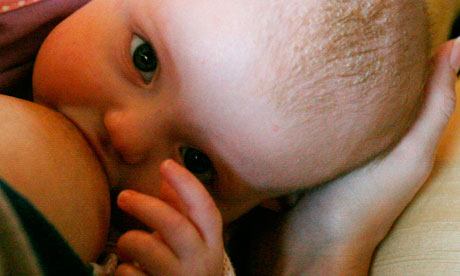
It is a debate that has raged for years, pitting mothers who follow Gina Ford and her routine-based approach to child-rearing against those who prefer the more laidback ways of Penelope Leach. Now the battle is set to intensify as new research suggests that babies who are fed on demand do better academically than those who are fed on schedule – although their mothers are more exhausted and grumpy.
The study shows that babies who are fed when they are hungry – with breast milk or formula – achieve higher scores in Sats tests at ages five, seven, 11 and 14, and that by the age of eight they have an IQ four to five points higher.
However, mothers who keep to scheduled feeding times score better on wellbeing measures, and report feeling more confident and less tearful.
Researchers from the Institute for Social and Economic Research (ISER) at the University of Essex and Oxford University believe they are the first to conduct a large-scale study into the effects of scheduled versus on-demand feeding. The research used a sample of 10,419 children born in the early 1990s, and took into account a range of background factors, including parental educational levels, family income, a child's sex and age, maternal health and parenting styles.
Dr Maria Iacovou, from the ISER, who led the research, said: "The difference between schedule and demand-fed children is found both in breast-fed and in bottle-fed babies. The difference in IQ levels of around four to five points, though statistically highly significant, would not make a child at the bottom of the class move to the top, but it would be noticeable.
"To give a sense of the kind of difference that four or five higher IQ points might make, in a class of 30 children, for example, a child who is right in the middle of the class, ranked at 15th, might be, with an improvement of four or five IQ points, ranked higher, at about 11th or 12th in the class."
The research compared babies fed to a schedule at four weeks of age with those whose mothers tried but did not manage to feed to a schedule, and with those who were fed on demand. The children of mothers who had tried but failed to feed to a schedule were found to have similar higher levels of attainment in Sat tests and IQ scores as demand-fed babies.
Iacovou said: "This is significant because the mothers who tried but did not manage to feed to a schedule are similar to schedule-feeding mothers. They tend to be younger, more likely to be single, more likely to be social tenants and likely to be less well-educated or to read to their child. These social characteristics are all understood to increase a child's likelihood of performing less well. It seems that it is actually having been fed to a schedule, rather than having the type of mother who attempted to feed to a schedule (successfully or not), which makes the difference."
Parenting experts who advise mothers to feed on demand if possible told the Observer they were not surprised by the findings. Psychologist Penelope Leach, author of The Essential First Year, said: "A baby's optimal brain development depends on communications between his 'emotional brain' and his mother's immediate and sensitive responses. The baby expresses strong feelings, the mother instantly recognises, responds and regulates them, comforting the baby when he is angry, soothing him when he is afraid; bringing him back on to an even keel when he is over-excited. A lot of that communication takes place around the baby's primary need and greatest pleasure: feeding."
Oliver James, the psychologist and author of They F*** You Up, said: "I'm not surprised to hear that women who feed on demand are more likely to be tired and tearful. Nor am I surprised that, if you are given good quality care as a baby, which includes being fed on demand, you are going to be more likely to be able to concentrate, have less trouble with authority and do well at school."

